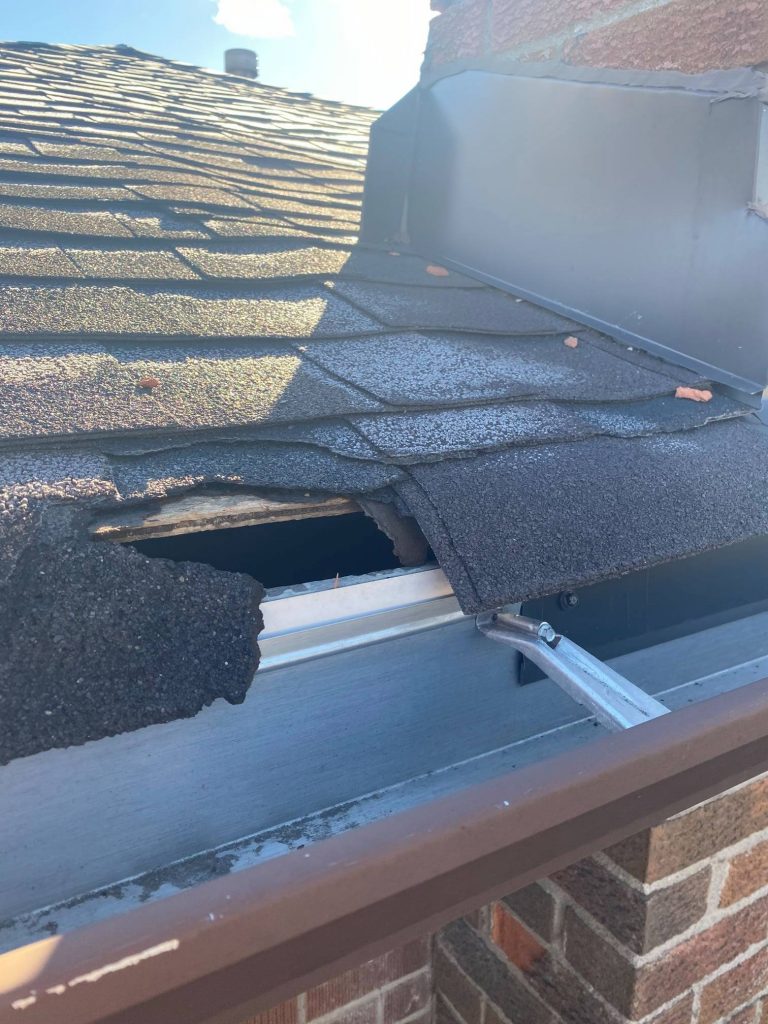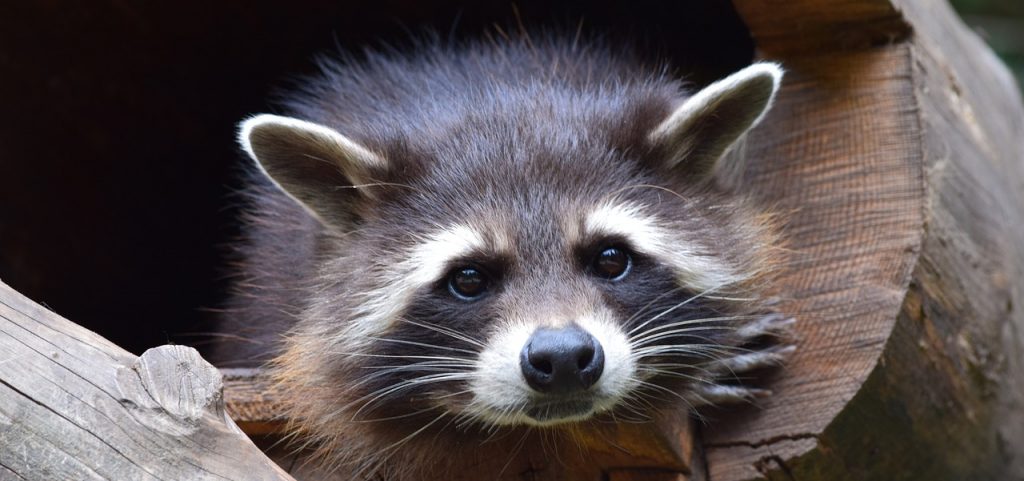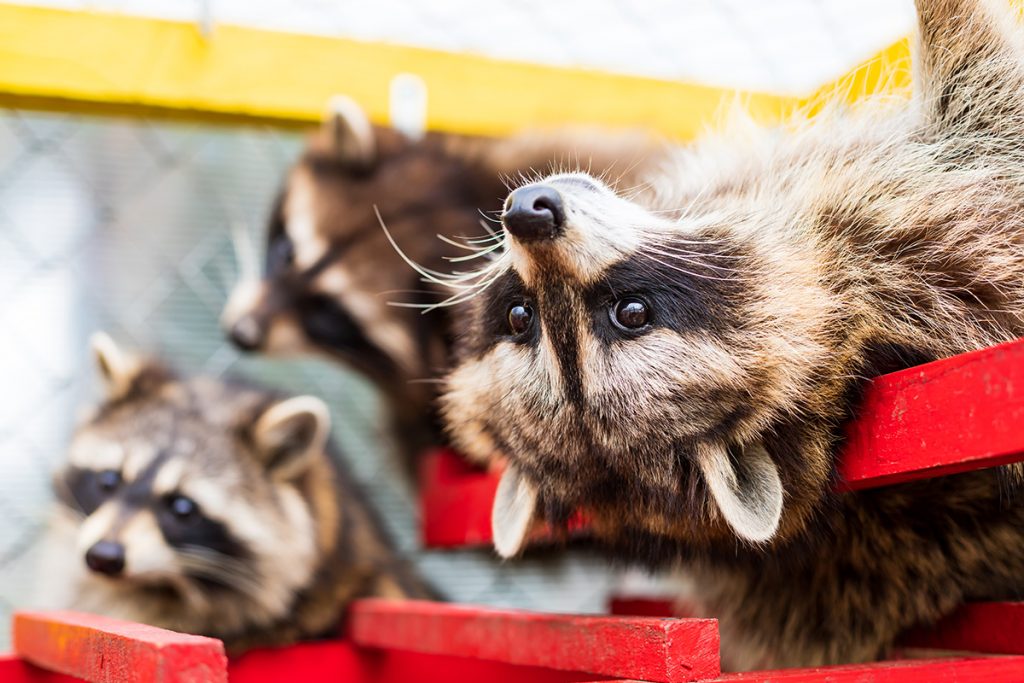Raccoons are among the most intelligent mammals, with between 438 and 512 million neurons in their brains. For context, a cat typically has 250 million. Golden retrievers have over 600 million neurons.
Neurons send and receive messages between the brain and the body. The more active the neurons, the more information is being processed. Raccoons have extremely sensitive, human-like hands with whiskers near their paws.
A raccoon’s senses are remarkable. They have good eyesight, despite being color-blind. They have a black mask around their eyes that reduces glare and enhances night vision. Their sense of smell is well developed, and they use it to locate previous places they have traveled.
Having such keen senses helps raccoons adapt quickly to new living environments. They also create challenges for you when trying to deter them from your property.
Raccoons in Your Home
Raccoons look for warm, dry spaces to hunker down for the winter and have a litter of kits. Their dexterous hands make it easy to turn doorknobs, open garbage cans, unlatch locks, enter pet doors, open food containers, and break shingles and siding as they climb chimneys.
If you have loose boards, vents, or noticeable cracks, raccoons will make them worse when entering your home. Once inside, the destruction begins right away. Insulation, drywall, and anything stored improperly is considered fair game to a raccoon. They will shred, rip, and tear materials to build a nest. They also create a latrine or spot where they leave feces and urine. They may choose your HVAC system as a place to build their nest, turning your ventilation system into a fire hazard.
Raccoons in Your Garden
Raccoons cause damage to the outside of your house and property just like they do to the inside. They wreck the appearance of trees by climbing up and down, stripping bark. Raccoons love to raid gardens and chicken coops. They will steal fruits and vegetables, bird eggs, and livestock feed. They will snatch fish and frogs from the water if you have a pond.

Raccoons will dig holes in your lawn, searching for worms and grubs. They love finding birdseed in a bird feeder. If you have a swimming pool, expect a raccoon to take a dip. They love swimming or floating. Before you enter your pool, check for raccoon feces near the steps. They often relieve themselves before exiting the pool.
Just like raccoons create latrines in your home, they also create them near your garden, usually in piles of logs or brushy spots. This becomes a problem because raccoon feces can carry roundworms or roundworm eggs that can harm humans.
Once you notice raccoon activity, your first thought may be on which deterrents to try first.
Raccoon Deterrents for the Home and Garden
Whether or not a deterrent keeps a raccoon away from your home depends on the raccoon. For example, many people use live traps, which can work and are safe and humane. The problem, however, is when the bait in the trap attracts other animals. Another problem arises when it is time to release the captured raccoon.
In most states, it is illegal to relocate a raccoon to a different property to prevent the spread of diseases. Therefore, you must release it on your property. The animal will return to its den inside your home within a few days.
Other deterrents, like the ones below, have pros and cons.
Smell Deterrents
Raccoons have great memories and can retain information for up to three years. This means they can remember the many smells they encounter throughout the day. A smell deterrent involves using a scent that raccoons hate, like the following:
- Peppermint oil
- Onions
- Peppers, especially hot and spicy
- Garlic
- Vinegar
- Citrus peels
- Ammonia
- Mothballs
- Epsom salt
- Coyote urine
While many of these may make a difference temporarily, none will keep a raccoon away long-term.
Disadvantages of Smell Deterrents
Smell deterrents work only if you consistently reapply the scents. The smell will fade if you don’t reapply, and the raccoon will continue its regular, destructive activity. Predator urine, ammonia, and moth balls have strong smells. Not only will the raccoon be offended, but so will you and your family.
Ammonia, mothballs, and other chemical compounded products are not healthy for humans or pets. They contain poisons that are harmful to anyone and anything. Plus, it can take a lot of chemicals to deter all wildlife. Reviews show chemicals are not always effective.
Raccoons are so bright that they don’t always leave the area when they encounter a terrible smell. Raccoons will further investigate the source of the scent. For example, if you apply coyote urine, raccoons will hang out to see if it is a coyote moving into their space. If they do not see a predator, they will not leave and return to their den within a day or so.
If smells don’t work, you may try to implement sound deterrents.
Sound and Light Deterrents
Sound and light deterrents use noise and lights to scare off raccoons. Examples of sound and light deterrents include the following:
- Clapping
- Fireworks
- Radio or loud music
- Windchimes
- Predator calls
- Dogs barking
Sound deterrents work best when placed in areas where raccoons are active, are loud enough to startle wildlife, and play continuously or at least for several hours while raccoons sleep. Disrupting a raccoon’s sleep can make them want to move on.
Light deterrents should have one or more of these traits: bright, flashing, unexpected, and sensitive to motion.
Like other deterrents, the ones involving sound have disadvantages.
Disadvantages of Sound and Light Deterrents
One of the biggest disadvantages of using sound and light deterrents is that they can affect you and your family just as much as the raccoon. If you are trying to keep a raccoon out of your attic, playing music nonstop will eventually interfere with your peace at home.
Sound and light deterrents must run constantly. When a battery runs out or the product breaks, raccoons use that lull to move back to your home or property.
Also, you must change the music or light regularly to avoid the raccoon becoming used to it. Ultrasonic sound machines emit high-pitched noises that only animals can hear. That’s a benefit. However, finding the correct level to deter raccoons can take a lot of trial and error.
Ultrasonic sound machines are not yet regulated by the Food and Drug Administration, so there are not enough scientific studies to prove they work.
What Is the Most Effective Raccoon Deterrent?
Sometimes the best offense is a good defense. Rather than deal with a problem after it happens, do what you can to prevent it.
Exclusions are the prevention methods for deterring raccoon activity in your home and garden. Exclusions for the home and garden include tips like the following:
- Seal all cracks and holes that a raccoon may see as a way to enter your home.
- Secure vents, chimneys, crawlspaces, and basements.
- Remove bird feeders.
- Improve storage for pet feed and garbage.
- Install an electric fence around your garden and chicken coop.
- Add fencing around fruit trees and bushes.
- Hire pest control to eliminate grubs and other insects from your yard.
- Install tree and roof barriers to prevent climbing.
- Install a motion-activated sprinkler system.

The key to deterring raccoons long-term is to make your home and property less attractive to raccoons. Reduce the amount of food, water, and shelter resources, and they won’t see your home as an excellent spot to create a den.
The best way to start implementing exclusions is to seek help from a professional wildlife control operator. They have extensive training on the habits and habitats of wildlife and can give you insight into which exclusions work best for each species.


